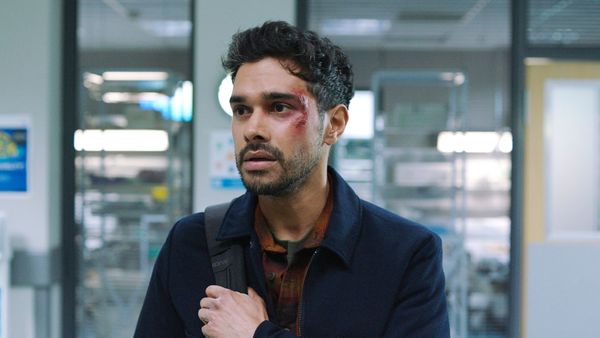The Casualty miniseries Breaking Point dives deep into the human struggles and systemic pressures that plague healthcare professionals. Set against the backdrop of an overstretched NHS, this 12-episode series, which aired from March to June 2024, masterfully portrays the toll that relentless pressure takes on its staff. As the show explores personal and professional lives crumbling under weighty responsibilities, it highlights why Breaking Point has become one of the most impactful dramas on TV. 
The central theme of Breaking Point revolves around the growing strain on NHS staff following the Covid pandemic. The narrative tackles the pressures within the Emergency Department (ED), where staff are not only fighting against overwhelming patient numbers but also battling their own personal demons. The show excels in highlighting the emotional toll this has on its characters, crafting a raw, human portrayal of the NHS crisis. What makes this storyline stand out is how it personalizes the struggle. The series focuses not only on the chaotic environment of the ED but also on how it destroys the individual lives of the medical staff, leaving them grappling with burnout, mental health issues, and a deep sense of failure.
One of the most compelling storylines in Breaking Point is the whistleblower narrative. As the ED team faces increasing pressures, someone from within their ranks leaks sensitive information about the department’s failing state, including its understaffing and lack of resources. This whistleblowing character sets off a chain of events that sees the ED staff torn between their loyalty to each other and the pressures from management to uncover the culprit. The tension builds as the mystery of the whistleblower’s identity becomes the focus of the series, adding layers of intrigue and distrust within the team. When the whistleblower’s identity is finally revealed, it is a moment that leaves the audience stunned—no one saw it coming.
Alongside this dramatic mystery, Breaking Point doesn’t shy away from exploring dark and taboo subjects, including suicide and male rape—topics that are rarely tackled in British television dramas. Rash’s struggle with mental health, culminating in a suicide attempt, is one of the most powerful moments in the series. The portrayal of his emotional unraveling, driven by the combined pressures of work and personal grief, hits hard. The final episode, which depicts Rash’s heartbreaking decision, is a gut-wrenching reminder of the toll mental health struggles can take, particularly on those who feel they must carry the weight of their responsibilities alone. His attempt to take his own life sends shockwaves through the entire ED team, showing the far-reaching consequences of a single individual’s suffering. 
Another pivotal storyline in Breaking Point is the exploration of male rape through the character of Teddy. This storyline is particularly groundbreaking as it focuses on the assault of a male paramedic by a group of women during a hen party—a subject not often explored in mainstream media. The series doesn’t simply treat Teddy’s assault as a plot device but instead provides a deeply empathetic look at his emotional struggle. Teddy’s feelings of shame and embarrassment, coupled with his fear of not being believed because of the gender dynamics at play, paint a realistic and sensitive picture of how male survivors of sexual assault might feel. His eventual decision to confide in his partner Jod and report the crime is an empowering moment that helps shed light on this rarely discussed issue.
Breaking Point is also bolstered by its standout villains. The arrival of Patrick, the clinical lead who proves to be both incompetent and manipulative, injects a much-needed source of conflict into the show. Played by Jamie Glover, Patrick is the type of villain that audiences love to hate. His relentless pursuit of the whistleblower, his undermining of his colleagues, and his efforts to manipulate situations create an antagonist that everyone can rally against. The way Patrick’s actions come to a head in the final episodes, with the entire ED staff uniting against him, is a climactic moment that rewards the viewer’s investment in the character dynamics.
Beyond the main drama, Breaking Point introduces a range of other compelling characters whose stories enrich the series. Siobhan, the clinical nurse manager, takes on a ‘mother hen’ role within the ED, standing up for her nursing staff against both external and internal pressures. Her character arc provides a sense of grounding and care amidst the chaos. Other characters, like Jacob and Nicole, also bring unique storylines that reflect different facets of life within the NHS. Jacob’s personal growth as he steps into a more paternal role for his abandoned grandchild offers a refreshing angle on his character, while Nicole’s lighthearted presence balances out the heavy themes of the show. 
Breaking Point excels in its depiction of real, human struggles. The show’s character-driven storytelling ensures that each person has their moment to shine, and every emotion is felt deeply. It’s a series that challenges the conventions of medical dramas, not only by focusing on the stress of healthcare workers but by exposing the social and personal issues they face away from the operating table. The show does an excellent job of pulling no punches, allowing these difficult topics to be explored with sincerity, care, and respect.
With a talented ensemble cast, Breaking Point is one of the best miniseries of Casualty to date. It shows how the right storytelling, combined with strong performances and an empathetic approach to its themes, can elevate a drama to new heights. The series may have started with a familiar premise, but its execution is anything but predictable. It’s raw, it’s emotional, and it’s a must-watch for anyone invested in the future of British television.
As the final credits roll, Breaking Point leaves viewers with a lingering question: How much more can our healthcare heroes take before they truly break? Will they rise above the system that’s failing them, or will they be crushed under its weight? The series leaves us to contemplate the future of both its characters and the NHS they represent.





